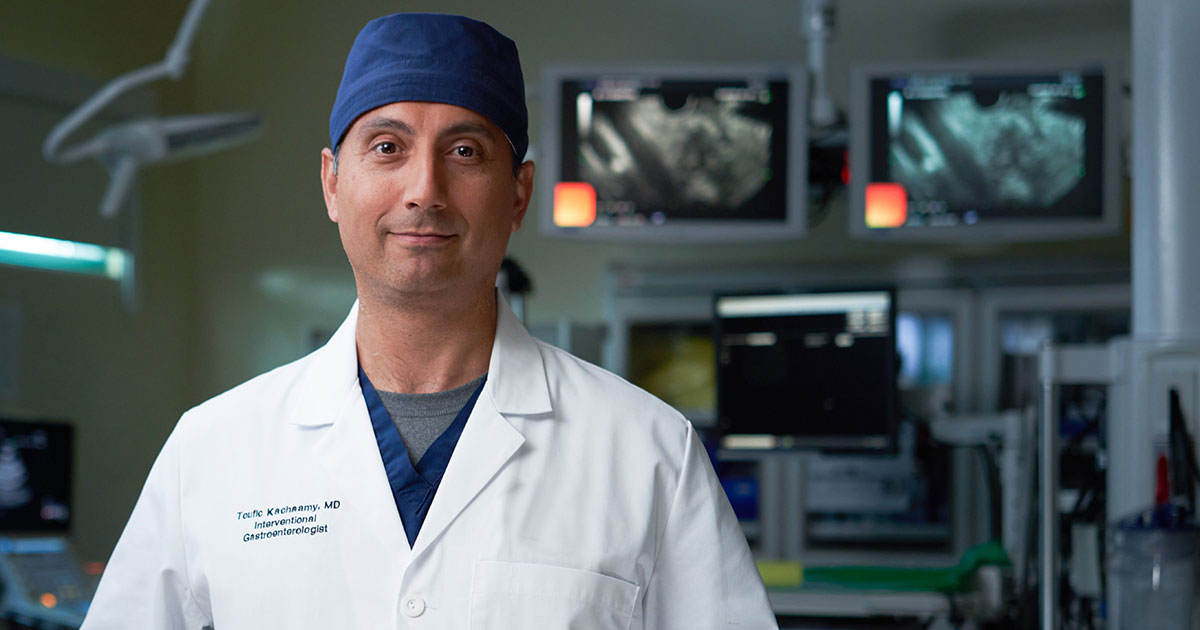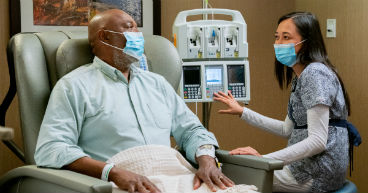
Cancer patients often have a number of questions and concerns during the treatment journey. Are surgery, drugs or radiation therapy my only options? What do I do if I lose my hair from chemotherapy? Should I get a genetic test? One additional question they may have upon meeting their treatment team is: Why would I need to see a gastroenterologist who specializes in stomach issues?
Optimal care for any type of cancer involves a team of healthcare professionals, each bringing their knowledge, perspectives and expertise to ensure a comprehensive and wholistic approach to your care.
A gastroenterologist often is an important member of the care team and may be involved in the initial diagnosis, if the cancer involves the digestive system or gastrointestinal (GI) tract. A GI specialist may also be included to address symptoms that develop due to other types of cancer and/or side effects from cancer treatments.
“Traditionally, cancer care used to be mostly the oncologist—whether surgical oncologist, medical oncologist [or] radiation oncologist—but there's a lot of other disciplines that not only have to add to the cancer care, like gastroenterology, but also make cancer care better,” says Toufic Kachaamy, MD, Medical Director of Gastroenterology at City of Hope® Cancer Center Phoenix.
In this article, we’ll explore:
- What does a gastroenterologist treat?
- Why would I be referred to a gastroenterologist?
- The role of GI specialists following cancer treatment
If you’ve been diagnosed with cancer and are interested in a second opinion on your diagnosis and treatment plan, call us or chat online with a member of our team.
What does a gastroenterologist treat?
Gastroenterologists specialize in the body’s digestive system. One way to think about a gastroenterologist’s focus is to consider the path of the food you eat. It makes its way down your esophagus through your stomach, intestines, colon and rectum. These organs are crucial to the food’s digestion and the elimination of waste from your body. Other organs, such as the pancreas, gallbladder and liver, secrete substances that help with digestion and help your body absorb important nutrients.
If you receive a cancer diagnosis for any part of the GI tract, a gastroenterologist is likely to be involved in the diagnosis and treatment plan.
Gastroenterologists also are skilled at using instruments to look inside the digestive tract to find growths, such as polyps or tumors or cancerous or precancerous cells.
An endoscopy is performed by inserting a thin tube equipped with a camera to look down the esophagus and into the stomach.
In a colonoscopy, the tube is inserted into the anus and through the rectum into the colon, or large intestines. Growths or suspicious cells can be removed during these procedures and sent to a pathologist to determine if they are cancerous.
“As technology is improving, there's a lot of things that we can do now endoscopically, which is expanding the role of the intervention of the gastroenterologist in cancer care,” Dr. Kachaamy says in an interview about the role of the gastroenterologist in cancer treatment in Targeted Oncology.
Why would I be referred to a gastroenterologist?
Even if you have been diagnosed with a cancer that is not associated with the gastrointestinal system, a gastroenterologist may be on your multidisciplinary team if the cancer has metastasized to an organ in the digestive system or to help address GI symptoms resulting from your cancer or its treatment.
"Symptoms related to the gastrointestinal tract represent a major part of the symptoms that cancer patients experience,” Dr. Kachaamy says.
These may include:
- Vomiting
- Diarrhea
- Constipation
- Weight loss
- Malnutrition
If you are losing weight or experiencing nausea and vomiting induced by chemotherapy, a gastroenterologist may collaborate with a dietitian to develop a plan intended to help you eat again and avoid malnutrition. A gastroenterologist also may be called on to place a feeding tube, if necessary.
If a tumor is blocking part of the GI tract—such as a bile duct, causing jaundice—a gastroenterologist may treat the condition by inserting tubes called stents, which allow fluid to flow through the body's ducts and blood vessels.
A GI doctor may also use cryotherapy as a treatment option to remove tumors in the esophagus that may be preventing a patient from swallowing.
The role of GI specialists following cancer treatment
Even after your treatment is complete, your digestive system may take some time to return to normal. Your care team, including a GI doctor, may help address symptoms like sores or dryness in the mouth or throat, an upset stomach, changes in appetite or bowel habits and assist you in ensuring your body is absorbing nutrients from your diet.
“A gastroenterologist experienced in taking care of cancer patients works with the oncology team to manage symptoms and improve quality of life and nutrition,” Dr. Kachaamy says. “All these help patients tolerate cancer treatment better.”
Dr Kachaamy suggests that gastroenterologist involved in cancer care become familiar with the field of endoscopic oncology and has launched a national effort to make endoscopic oncology more a mainstream and robust evidence-based field. His efforts focus on promoting collaboration, education, and research in this field. To this end, he hosts an annual conference Advances and Innovations in Endoscopic Oncology and Multidisciplinary Gastrointestinal Cancer Care to bring all stakeholders, oncologists, gastroenterologists and others together to promote the field.
If you’ve been diagnosed with cancer and are interested in a second opinion on your diagnosis and treatment plan, call us or chat online with a member of our team.



